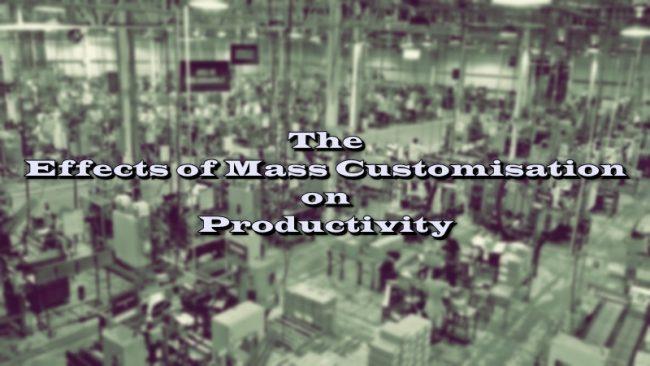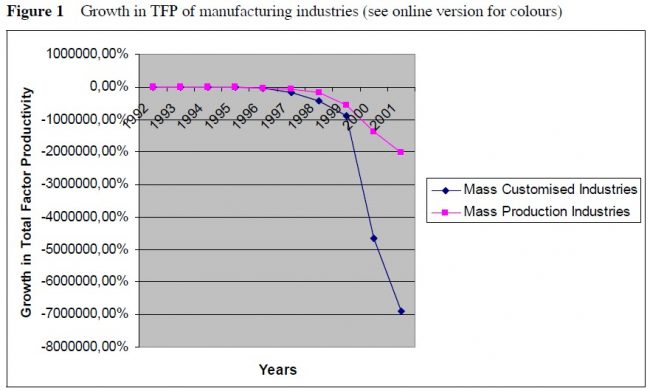
The Effects of Mass Customisation on Productivity
In the last two decades, demanding customers put manufacturing industries under the pressure of customised product orders. This market condition forced manufacturers to follow and adopt a customer-oriented philosophy. Therefore, some manufacturing industries began to change their business processes accordingly to actualise mass customisation systems. It can be inferred from this that such a big technical change must have a great impact on productivity. Therefore, this study aims to analyse the effects of the Mass Customisation (MC) concept on productivity.
To measure the productivity change in the manufacturing industries of Turkey, the Two-Deflator Growth Accounting Approach is applied. In this frame, MC and Mass Production (MP) industries were compared according to their value-added, capital contribution, labour contribution and productivity. The findings contradict the current literature and imply that the price of customised products is higher. In this frame, to enhance productivity and lessen the price, some suggestions that are related to human quality upgrades and
technical changes are provided.

The major aim of most production systems is to make profit. Therefore, they produce goods and services while trying to solve a dual problem at an optimum point where objective is both minimising costs and maximising profit due to competitive market conditions (Hounshell, 1984). These conditions force manufacturing firms to apply new management and planning approaches to survive and gain competitive advantage.
Before the 1970s, products were rather expensive; therefore, manufacturing systems try to find ways to become mature. This quest led to the acceleration in the application of the Mass Production (MP) concept (Pine and Davis, 1999). MP systems are able to meet increased demand through standardised processes and affordable products in a reasonable time period (Womack et al., 1990).
After this progress, market conditions begin to change rapidly. By the help of emerging Information Communication Technologies (ICTs), new concepts are enabled to be implemented. The idea behind employing the applications of ICT, is to enhance productivity (Notaro, 2003). Further improvements in ICT led to the emergence of Flexible Manufacturing Systems (FMSs) which integrate various technologies. FMSs help to improve productivity and have the ability to quickly adapt to changing conditions (Buzacott and Yao, 1986).
Next decade, markets become highly diversified and global. In response to environmental pressures, manufacturers start applying the new concept of ‘lean production’ in the frame of MP. The major aim for following this concept is to enhance performance further. Afterwards, markets have become increasingly characterised by turbulence which leads to a situation in which lean practices are insufficient (Yusuf, 2002).
Unexpected change became the key factors for remaining competitive; therefore, survival requires adoption of new practices. The need for better methods to rapidly and cost-effectively operate production facilities and meet demand led to the emergence of the concept of ‘agile manufacturing’ (Gunasekaran, 1998). This approach can be defined as the capability of a manufacturing system to react quickly and effectively in a competitive environment which is unpredictable in advance.
In the last two decades, emerging factors which include high-quality requirements and demanding customers begin to affect market conditions (Nagalingam and Lin, 1999). Therefore, market started to be driven by customer-designed products which increase competition among manufacturing systems (Goldhard, 1992).
This pressure and the competitive market conditions cause manufacturing systems to seek solutions to survive and gain competitive advantage. Due to these changes, some manufacturing systems start supplying customised customer orders. Therefore, at the end of the 1980s, some manufacturing systems are obliged to follow customer-oriented philosophy (Davis, 1989).
For the full paper please contact to: arzualvancom@gmail.com